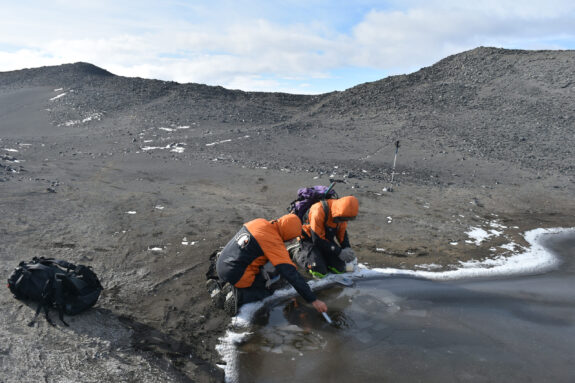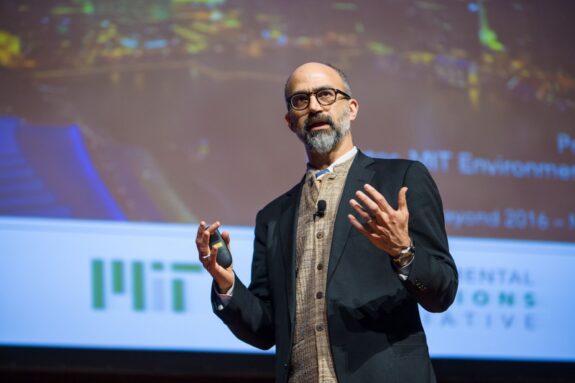Professors Heald and Li provide stellar advising in challenging times.
Read this at MIT News
Professors Colette Heald and Gene-Wei Li have been honored as “Committed to Caring” for crafting inclusive laboratory environments, as well as continually empowering their students. A hurdle like the Covid-19 pandemic can easily throw student well-being and research off-kilter. Having such caring advisors can help students persevere amid uncertainty.
Colette Heald: an inspirational advocate
Colette Heald is a professor in the Department of Civil and Environmental Engineering as well as a professor of earth, atmospheric, and planetary sciences. Through her research, Heald investigates global atmospheric composition and chemistry, focusing on how this impacts air quality, climate, and environmental health. Heald’s research has significantly advanced discussions of the combined effects of climate change and air pollution on diminishing crop yields and global food insecurity.
Heald emphasizes that a PhD is an arduous process that “inevitably [has] personal and professional bumps.” Most of all, Heald wants to “create an environment where members of [her] group can rely on [her] for research guidance and for support whenever they need it, while feeling empowered to lead their own research.”
To achieve this balance, Heald provides a forum for regular, clear communication and mutually agreeable expectations. Writes one advisee on speaking with Heald: “I know that I will be heard no matter what the case may be.” Heald meets with each member of her lab weekly, finding that individual needs for these meetings vary greatly. Consistently and empathetically engaging with advisees is a Committed to Caring (C2C) Mentoring Guidepost.
In the midst of the Covid-19 pandemic, Heald is keenly aware of the ways isolation hampers positivity and productivity. She devotes extra time to meeting with students and creating informal Zoom breaks where students share “stories about how we are all adapting to this [shifting] normal.” She looks forward to the time when it will be safe to return to an in-person “vibrant back-and-forth on research and technical questions.”
Structural and individual support
Navigating an academic field is often rife with obstacles. Heald supports her students by communicating with them about the norms of the field, as well as advocating for them in inequitable situations and when dealing with challenging personalities.
In one instance, a postdoc lost their funding, and Heald found financial support for them. According to a nominator, she also “fought to remove potentially discriminatory practices in funding [maternity] leave, that might bias professors away from hiring women postdocs.” Heald’s advocacy spans both individual situations and work on structural reform.
Heald developed conscientious and considerate advising practices over time, through observing what was effective in her and others’ mentoring relationships. As a postdoc, she attended three laboratory groups’ meetings and observed the professors’ differing approaches. She emphasizes the development of an advising style that works for both the individual mentee and the advisor.
Describing Heald concisely, one advisee opts for “#mentorgoals.”
Gene-Wei Li: amplifying diverse voices
Gene-Wei Li is an assistant professor of biology. He joined the MIT faculty in 2015, after completing a PhD at Harvard University and a postdoc at the University of California at San Francisco. A biophysicist, Li studies how bacteria optimize the proteins they produce. His laboratory focuses on design principles of transcription, translation, and RNA maturation in the face of competing cellular processes.
“Metaphorically an endlessly deep vessel,” according to a student nominator, Li “nurture[s] everyone around him both in scien[ce] and, more importantly, personal development.”
Harmonious support
Intrinsically attuned to students’ needs, Li often notices when students could use academic or personal support without being prompted. When one student was feeling burnt out, Li listened closely to understand their individual experience of burnout and what could help them recuperate. The student returned refreshed, “engaged and motivated to work on a day-to-day basis.” Li prioritizes mental health and makes clear that he values students.
Setbacks are inevitable in experimental work. Li works with students to build resilience to research impediments, as well as to collaboratively problem-solve. This emphasis on learning, development, and practice over achievement is a Mentoring Guidepost.
In thinking about guidance during the Covid-19 pandemic, Li offers a thoughtful framework. Being “proactive” amid uncertainty is central. Li’s lab started preparing to work from home in February. He writes, “Acting early is important to both ensure research continuity and reduce emotional impact when an avalanche of restrictions are implemented.”
Li has developed individualized plans with students based on two key principles: “safety cannot be sacrificed,” and “[the student’s] career must advance.” A lingering challenge that many faculty including Li face is how to find ways to interact regularly and informally with lab members while simultaneously homeschooling their own kids.
Building an inclusive community
Li works to intentionally craft a caring laboratory environment. According to Li, he purposefully seeks out “a team with diverse viewpoints and [an] eagerness to help each other.” Students are grateful for this effort, feeling supported by their colleagues. Writes one student nominator, “I’ve always come out of chats with my labmates feeling like my thoughts were heard and that people were genuinely invested in giving me good feedback.”
Being adaptable and requesting feedback in ways that enable students to comfortably share their candid views is a strong skill of Li’s. Referencing how Li solicits feedback and his genuine interest in students’ lives, students describe it as “refreshing to have an advisor who treats us as equals.”
Li also knows how to gracefully guide others in crafting inclusive environments. One student writes that Li “always corrects my implicit biases … Thanks to his awareness, I have been able to start correcting these biases.” This is vital, challenging, and delicate work. Having courageous conversations and fostering inclusivity are Mentoring Guideposts identified by the C2C program.
Nurturing and perceptive, Li is dedicated to the personal and scientific growth of all those around him.
More on Committed to Caring
The Committed to Caring program is an initiative of the Office of Graduate Education and contributes to its mission of making graduate education at MIT “empowering, exciting, holistic, and transformative.”
Since 2014, C2C has invited graduate students from across MIT’s campus to nominate professors whom they believe to be outstanding mentors. Selection criteria for the honor include the scope and reach of advisor impact on graduate students’ experience, excellence in scholarship, and demonstrated commitment to diversity and inclusion.
The most recent outgrowth in 2019 took the form of a Faculty Peer Mentorship Program (FPMP) in which C2C faculty act as peer mentors to incoming MIT professors. The program provides one-to-one matches with the goal of fostering strong mentorship practices and providing a network of support.
By recognizing the human element of graduate education, C2C seeks to encourage excellent advising and mentorship across MIT’s campus.
Story Image: Professors Colette Heald (left) and Gene-Wei Li have been honored as “Committed to Caring” for crafting inclusive laboratory environments, as well as continually empowering their students. Credits: Gretchen Ertl



